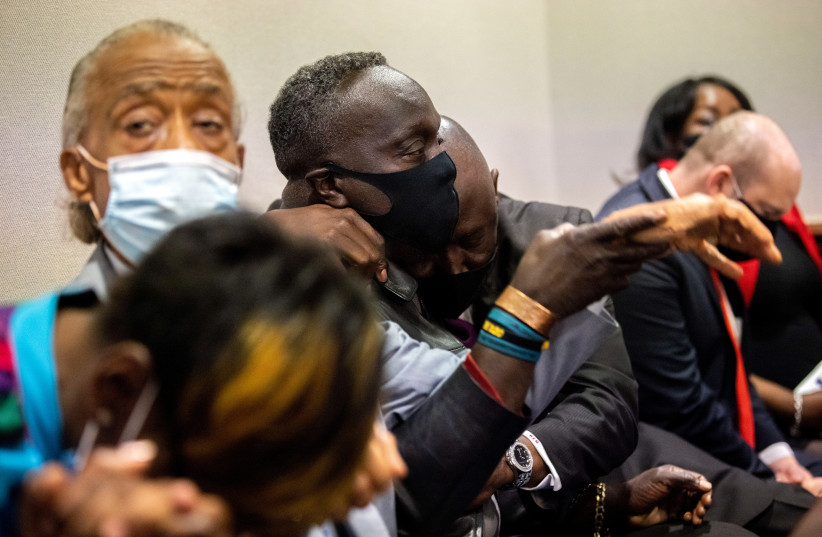The three most recent trials centered around racial hatred and violence in the United States offer us a broad canvas for examining the persistence of racism. Two of those trials resulted in vastly different verdicts. Kyle Rittenhouse was found not guilty of murdering three Black Lives Matter rally participants he shot, while Gregory and Travis McMichael and George Bryan were found guilty of murdering Ahmaud Arbery when they shot him. The “Unite the Right” rally organizers in Charlottesville, VA were ordered to pay $26 million in punitive damages to counter-protesters as well as to the city, for trauma and damage they inflicted.
That race was a recurrent theme in each trial is obvious. That each defendant claimed he was acting in self-defense is entirely unsurprising. Not so obvious is the way that these arguments of self-defense, intersecting as they do with racist motivations, form a stubborn pattern of human self-justification: the assailant convinces himself beforehand that the victim he antagonizes is out to destroy him. His ingrained anticipatory hatred is so powerful that he appears genuinely incapable of understanding how his violent behavior could be anything other than self-defense. We Jews need only remember how the Nazis saturated an all-too-willing German public with images of us as infesting vermin to understand how potent such toxic thinking can be.
This moral blindness is ancient. It is reflected, however with great nuance, in the biblical story of Cain and Abel, one of humanity’s oldest narratives about the dialectic between hatred and brotherhood. The story is generally read as an account of sibling jealousy and rivalry, and its multi-generational effects on families. Yet jealousy and rivalry alone don’t turn the majority of family members into murderers. Were that the case, fratricide and its would-be practitioners would be far more common in families.
The Bible tells us that after God rejected Cain’s offering in favor of Abel’s, Cain becomes enraged and his face falls, a profound embodiment of his anger and sadness. What is the match that lights that rage, turning it into murder? Earlier in the story, Cain, the older child, is named proudly by his mother Eve who confirms his high status when she declares: “I have created a child with the help of the Lord.” Let’s suppose that until the moment of his offering’s rejection, Cain stands in utter contrast to Abel, his afterthought of a sibling whose Hebrew name, Hevel, literally means “vapor.” Cain knows that he occupies the top of the caste-driven hierarchy of his family. His brother has no real name, no real voice and no real status.
Yet God’s rejection of Cain’s offering – whatever God’s motivation may be – upsets the family’s rigid caste assumptions and structures. Abel, the marginalized one, now at least has the potential for real power. We can imagine that this not only enrages Cain with jealousy but fills him with terror as he contemplates his potential loss of power and prestige. How easy it then becomes for the biblical “sin crouching at the door” of Cain’s heart to convince him that he is fast becoming the victim of Abel, who he must now obliterate to protect himself.

The Bible records a strange ellipsis, an empty space between two actions or speeches when it writes that, “Cain said to his brother, Abel… and when they were in the field, that Cain set upon his brother Abel and killed him.” Generations of interpreters have supplied imaginative dialogues to fill in this gap, and our generation would be no different in this regard.
We can imagine Cain saying to Abel what white supremacists said about Jews in Charlottesville: “You will not replace me.”
We can imagine Cain, an ancient Kyle Rittenhouse, crying on the witness stand about how traumatized he was by Abel, despite having walked into their encounter as his willfully weaponized antagonist.
We can imagine Cain approaching, chasing, and murdering Abel, charged by the same paranoid, righteousness-tinged suspicion with which three white men chased and gunned down Ahmaud Arbery, a man condemned to death by them for “running-while-black.”
We read and imagine Cain and Abel into and out of these modern accounts of defensive, self-justifying violence that overlaps with racial hatred and bias. Yet doing so will not bring back to life the victims of these or any other acts of violent hate crime. It will not undo someone’s paranoid self-justifying hatred leading to that violence. Why all this exegetical effort?
Modern culture critics remind us that our stories are not merely stories: they are products of our experiences, constantly influencing and reflecting our worldviews and values. The reading of a culture’s texts – sacred and secular – is never merely about visiting our past, but about struggling to hear that past echo throughout our present. The rabbis of the Talmud alluded to this when they taught that maasei avot siman l’vanim, the actions of the ancestors are a sign for the descendants. As such, Cain and Abel is more than mythic history, it is also the anguished truth underlying our current events, about which we need to be constantly aware if we are to save our human family from Cain’s recurrent brutality.
Yet the redemptive side of Cain and Abel – God’s repeated admonition that Abel is Cain’s brother – is also more than mythic history. Our constant return to the “first things” of core religious texts such as Cain and Abel forces us to strengthen our resolve to see our brother behind the person we have turned into the “other.” Cain’s sly rhetorical jab at God is thus transformed into the hope-filled, haunting and healing, waiting-to-be-answered question that humanity must never stop asking:
“Am I my brother’s keeper?”
Yes, we are.
The writer is the rabbi of Congregation Ohav Shalom and an author living in Albany, New York. He has written the book Cain v Abel: A Jewish Courtroom Drama (Jewish Publication Society, 2020).
